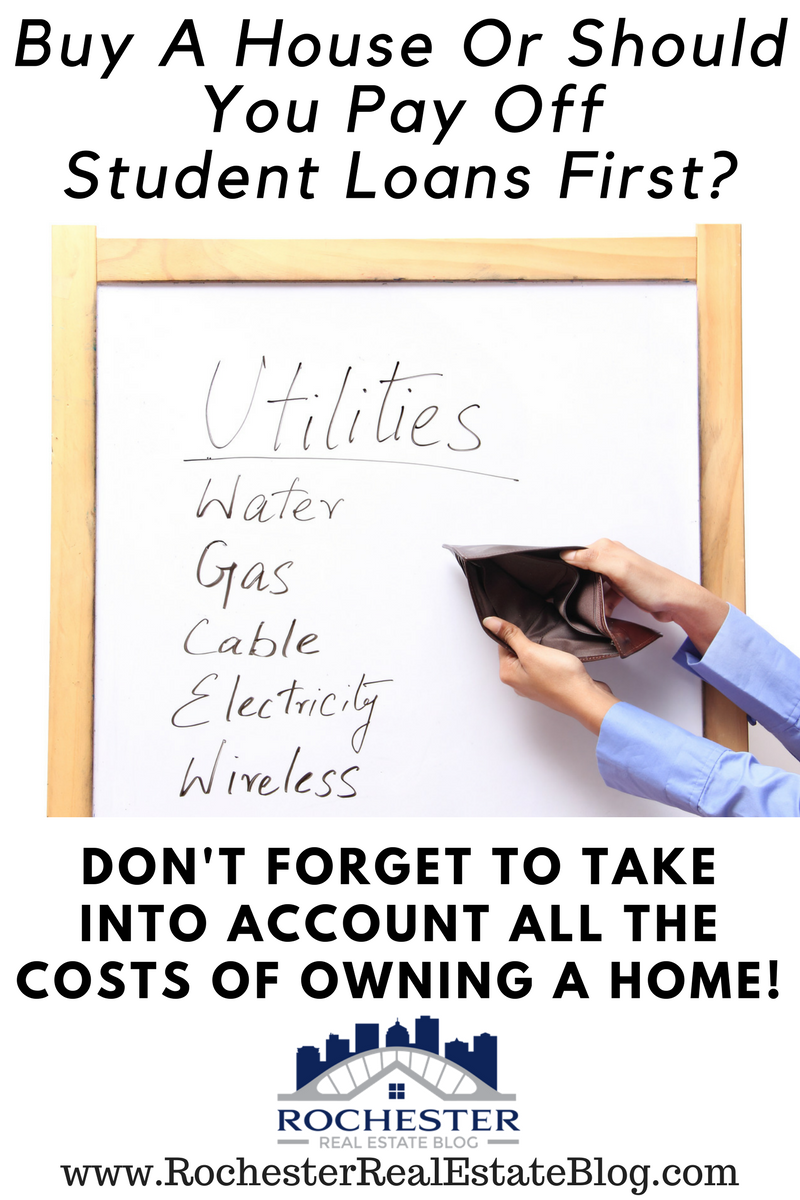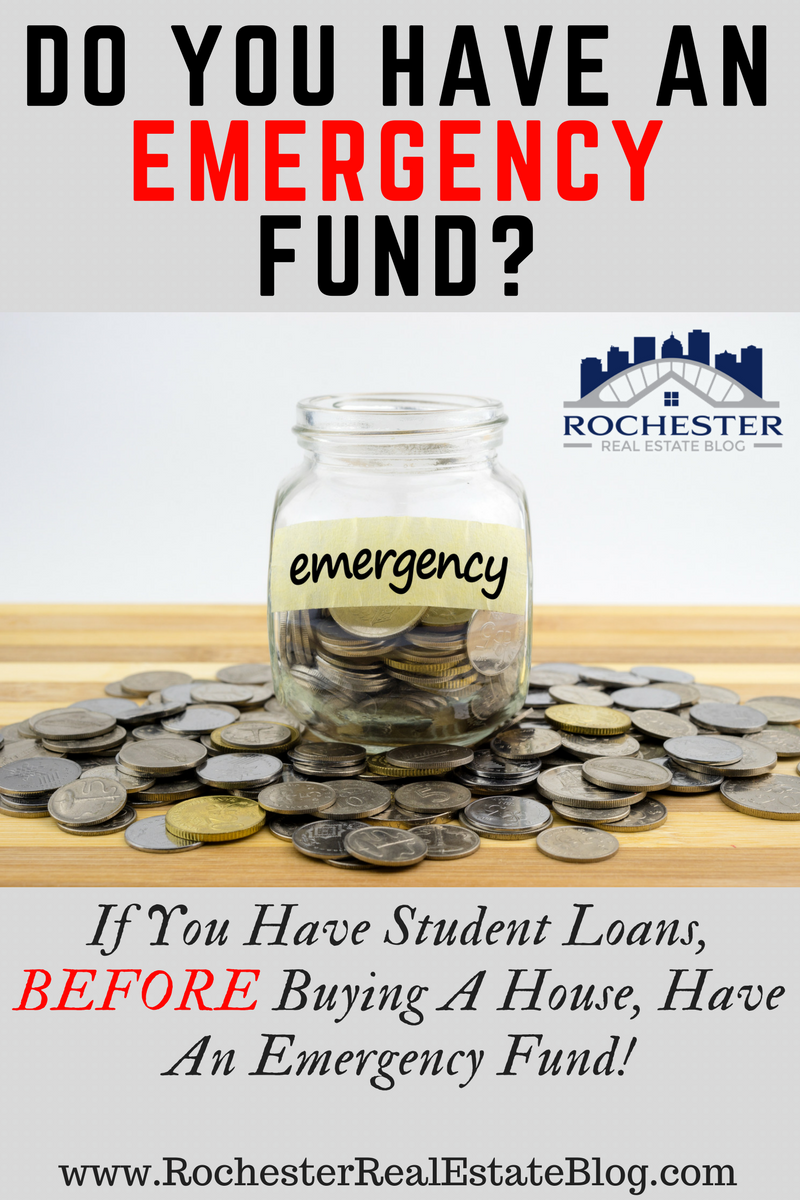Should You Pay Off Student Loans Before Purchasing a Home?
Have questions about buying or selling a home?
Ask Now!10 Signs You’re Ready To Purchase A Home (Even With Student Loans)

Should You Pay Off Student Loans Before Buying A House – 10 Signs You’re Ready To Buy A House
As a young professional working in the real estate industry and a millennial, I often run into the question: should I pay off my student loan debt before purchasing a home?
I’ve even asked myself this question.
Student loans can impact a buyers ability to get a mortgage quite significantly. Purchasing your first home is one of the biggest financial decisions you’ll ever make. Before you take the leap, be sure to complete as much research as possible and to talk with friends and family.
This article, “should you pay off student loans before purchasing a home,” is intended as a simple check list to the major components of purchasing a home with student loan debt.
If you can truthfully answer yes to the ten questions below, then you might just be ready to purchase your first home!
1.) If Your Income-to-Debt Ratio is High
When you apply for a mortgage, mortgage lenders will review your credit history and consider your current debt levels from student debt, credit card debt, auto loans, and other forms of debt.
You should also evaluate your own debt levels before taking on the responsibility of home ownership.
For instructions on how to calculate your debt-to-income ratio, check out this debt-to-income ratio calculator.
2.) Your Student Loan Interest Rates Are Low
For many individuals, including myself, a college education is impossible to obtain without acquiring some debt.
When it comes to choosing a loan, it’s best individuals exhaust all federal forms of loans before taken on a private loan. Most federal loans have an interest rate between 3.5-7%, but vary in their repayment terms.
Below are a few common types of loans –
- Direct Plus Loans – Available for graduate or professional students and parents of depend undergraduate college or career students.
- Direct Subsidized Loans – Available for students that can prove financial need. These loans do not accumulate interest until after graduation and allow for a 6-month grace period.
- Direct Un-Subsidized Loans – Available for students that can prove financial need. These loans do accumulate interest while the student is in school.
- Direct Consolidation Loans – A Direct Consolidation Loan allows borrowers to combine multiple federal education loans into one single loans. Consolidation has a few benefits including the ability to lower your monthly payment and allowing a longer repayment period.
Experts recommend paying off loans if they contain an interest rate of 6% or higher. If you possess a loan with interest rates of 5% or lower, it may be best to diversify your account. Most other investments, such as a mortgage contain a lower or similar interest rate.
Investopedia notes any professional should diversify their investments to minimize risk and increase returns, or simply to not put all of your eggs in one basket.
3.) You’ve Taken Into Account ALL of the Costs of Home Ownership
Owning a home comes with many more responsibilities than just paying a monthly mortgage. A few of the additional costs to take into account include utilities (Ex; gas, electric, water), cable, internet, and garbage.
Buying a home also comes with transaction costs, repairs, and property insurance. It’s vital that before you decide to pay off student loans and buy a home, you understand how much it costs to buy a home!

Buy A House Or Should You Pay Off Student Loans First?
4.) You’re Not Moving Anytime Soon
If you have a stable job in a city you love, purchasing a home is worthwhile.
On the other hand, if you are unsure of where your career will take you in the next five years, reconsider making your purchase. Use 5 years as a benchmark.
Experts say it takes at least five years before most will break even on a house. For the first few years of home ownership, you’ll be paying mostly interest and not the principal on the home.
5.) Your Home Will Appreciate
An immediate benefit of purchasing a home can be the additional value gained through appreciation. In fact, appreciation in most immediate benefit of purchasing a home.
In addition, there are generally four signs that your prospective home will appreciate in value –
- Size of the home -In the real estate the land underneath of a home will affect its appreciation rate far more than the actual home itself. Smaller, less appealing properties thus offer greater returns.
- The location of the home within a neighborhood – Generally homes on cul-de-sacs, with private backyards, and away from main streets sell for more than homes in less desirable locations.
- The average age of neighborhoods – The age of neighbors can be a huge clue as to how much a home will appreciate in the future. Neighborhoods with young families generally correlate with higher test scores.
- Future development in surrounding areas – When searching for your first home, inquire with your real estate agent whether future prospects for commercial and municipal (public) development in that area.
6.) You Maintain a Healthy Credit Score
The best mortgages require excellent credit scores. However, if your credit score is below 740, you may want to wait on purchasing a home.
If your credit score was to take a dip from ignoring your student loan debt in favor of your mortgage, then reconsider purchasing a home for now.
There are plenty of free resources to check on your credit score, including – Credit Karma, Credit Wise, and myFICO.
For tips on how to improve your credit score, check out this article that provides 12 tips to improve your credit score in order to buy a home.
7.) You Have An Emergency Fund

Should You Pay Off Student Loans Before Buying A House – Always Have An Emergency Fund
Experts advise having an emergency fund with about three to six months’ worth of income.
In addition, take into account that your emergency fund should increase once you own a home. In the event that you were unable to afford mortgage payments, you would need a backup plan.
For more information on planning your emergency fund, check out Vangaurd’s blog here.
8.) You’ve Considered Other Investments
Many Americans have dreamed of owning a home their entire life. However, other investments are worthwhile as well.
Consider other profitable markets like retail stocks, Facebook, or dare I say BitCoin!? Do you have a 401(K) or retirement fund?
Be sure to consider other diversifications before concluding property as your first investment.
They say property is always the safest investment. However, if you are a young professional in a market that is difficult to purchase a home (such as where I live in San Diego) it may be wiser to seek out other investments.
9.) You Have a Steady Source of Income
Some industries mean individuals will have fluctuating sources of income. Commission based industries often entail fluctuating salaries.
It’s important before you pay off student loans in order to purchase a home, you have a nice steady income source. Many mortgage products will require this as a condition to get approved for a mortgage as well.
10.) You Have a Good Gut Feeling
“Adulting” as we millennials put it is complicated. But, above all else your gut feeling will tell you what’s right.
If you are being pressured into purchasing a home because of a new marriage, familial pressure, or societal expectations, reconsider whether YOU want to purchase a home.
Other Helpful Home Buying Resources
- Guide To Buying A Home – 14 Step Process To Home Buying Success!
- Rules To Follow When Buying A Home via Michelle Gibson
- What Buyers Wish They Knew Before Buying A House via Lynn Pineda
- Tips For Buying Your First Home via Bill Gassett
About The Author: The above article “Should You Pay Off Student Loans Before Purchasing a Home?” was written by Kristina Brunnler. Kristina is a Marketing Specialist at Zurple Inc. She specializes in inbound marketing, including blogging, emailing, social media, and paid advertising. For more Real Estate advice, check out her articles on Zurple’s Real Estate Success blog.
About Rochester’s Real Estate Blog: Rochester’s Real Estate Blog is owned and operated by Kyle Hiscock of the Hiscock Sold Team at RE/MAX Realty Group.
With over 35 years of combined experience, if you’re thinking of selling or buying, we’d love to share our knowledge and expertise.
We service the following Greater Rochester NY areas: Irondequoit, Webster, Penfield, Pittsford, Fairport, Brighton, Greece, Gates, Hilton, Brockport, Mendon, Henrietta, Perinton, Churchville, Scottsville, East Rochester, Rush, Honeoye Falls, Chili, and Victor NY.